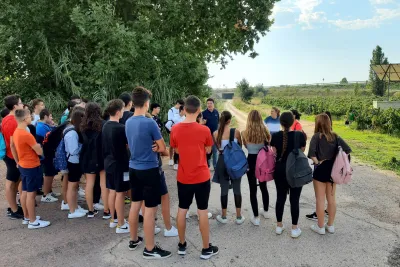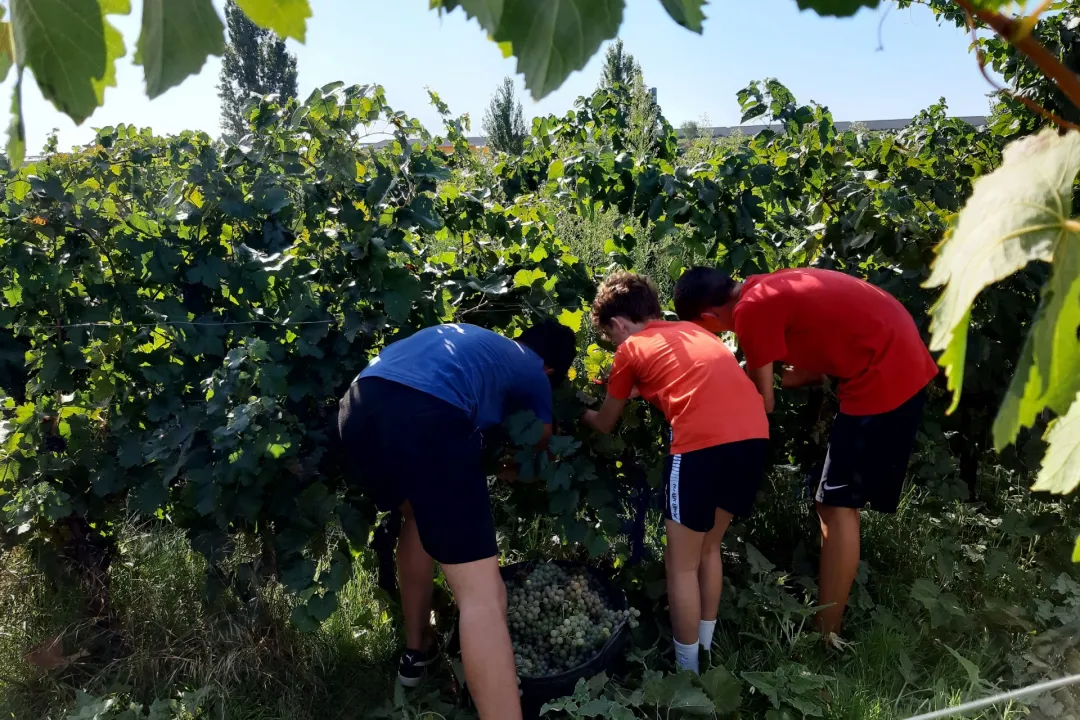General information
RDP Priority
- P6. Social inclusion and local development
RDP Focus Area
- 6A: Diversification & job creation
RDP Measure
- M01: Knowledge transfer & information actions
Beneficiary type
- Non-governmental organisation
Summary
This generational renewal project aimed to transmit viticultural culture to the youth of nine Spanish towns that are part of a Designation of Origin (DO) wine group. In 2016, the DO regulatory council started using EU funding from the CAP to promote training for young people as future generations of viticulturalists.
Pupils from five secondary courses participated in writing and photography competitions, as well as a range of practical and informational events that connected viticulture experts with potential new personnel.
A comprehensive range of job opportunities and career options was highlighted, including viticulture, oenology (wine production), marketing, communication, commercialisation, business management, research and engineering.
Project outcomes support prosperous and sustainable legacies, which aid social cohesion and the resilient development of a region that heavily depends on its connection to the land and its viticultural tradition.
Results
- 4 500 viticulturists, 32 000 hectares of vineyards and 116 wineries benefited from results promoting qualified personnel for generational renewal.
- ung people have acquired entrepreneurial and management skills that improve their job opportunities and contribute to sustainable economic development in the region by creating new businesses and strengthening existing ones with the input of various professionals rooted in the territory.
- Students gained a deeper appreciation for their local environment and the value of conserving rural landscapes that support local biodiversity associated with viticulture.

Promoter
DO Utiel-Requena Regulatory Council
Funding
RDP support: 13 500 (EUR)
EAFRD: 4 000 (EUR)
National/Regional: 9 500 (EUR)
Ressourcen
Context
Rural education can help bridge the gaps between traditional agricultural practices and modern economic needs. Educating rural children about local farming systems, like vineyards, preserves cultural heritage and ensures sustainable development in these regions.
As many rural areas face depopulation and an ageing workforce, equipping younger generations with agrifood knowledge can enhance their employability while simultaneously providing local farms with much-needed expertise. Understanding local farming systems fosters a sense of identity and connection to the land among rural youth.
Learning about vineyards, for instance, helps youth appreciate the economic value and historical significance of these agricultural practices. Education that integrates practical skills related to viticulture allows students to envision viable career paths within their communities. This localised approach not only counters urban migration but also encourages young people to invest in their home regions, thereby contributing to a robust local economy.
Also, it becomes increasingly important for future generations to be knowledgeable about sustainable practices in vineyard management. Schools that provide curricula focused on environmental stewardship and innovative farming techniques empower students to contribute positively toward adapting local agriculture to changing conditions. In doing so, they cultivate a workforce capable of addressing contemporary challenges while ensuring that traditional farming methods are preserved for future generations.
In Spain, a group of DO wine growers partnered with local schools to raise awareness, generate interest in and promote the generational renewal of viticulture. EU funds from the CAP were used by the Utiel-Requena DO Regulatory Council for this project’s work with five schools.
Objectives
The project’s broad partnership aimed to collate a critical mass of local viticulture expertise and education outreach channels to:
- Address the lack of generational renewal, depopulation, and improve the professionalisation of the sector with people rooted in the land.
- Ensure a better future for the viticulture of the DO Utiel-Requena.
- Promote viticultural culture and awaken the interest of the entire educational community, as the project was directed not only at students but also at educators and the parents' associations.
- Create opportunities and promote practices that protect the environment and ensure long-term environmental, economic and social sustainability.
- Preserve the historical, economic, social and cultural heritage of the DO Utiel-Requena and its region.
The project team also planned to benefit the entire region by promoting viticultural culture at all levels, generating synergies and interest for young people rooted in their local land.
Activities
The DO Utiel-Requena Regulatory Council, the Requena School of Viticulture and Oenology, the Interior Wine Land Community representing nine municipalities, the Bobal Territory Association and La Campesina agricultural company all worked together on the project’s rural development actions with the five secondary schools (IES Miguel Ballesteros, IES Alameda, and Colegio Santa Ana in Utiel, and IES Nº 1 and IES Oleana in Requena).
A comprehensive range of job opportunities and career options was spotlighted by project actions, including viticulture, oenology, marketing, communication, commercialisation, business management, research and engineering. The timeline for these project actions was:
- 2016. Start of the project as a pilot project at the IES Miguel Ballesteros of Utiel. Vineyard planting.
- 2017. The DO Utiel-Requena Regulatory Council (CR) held a meeting to introduce the project to the other secondary schools in the region: (IES Alameda and Colegio Santa Ana in Utiel and IES Nº 1, IES Oleana in Requena). The response from all was a resounding 'Yes, delighted to participate'.
- Promotional activity from the regulatory council to communicate career guidance activity and a short film contest as a joint activity for all centres.
- 2018: Coordination meeting with the centres and promotional activity for a literary contest 'A Vineyard with History' in which 21 organisations participated (primary schools from the entire region joined in).
- 2019: Promotional activity to present the publication of a book with the awarded stories from the literary contest. At the event, a plaque was given to the five institutes as participants and collaborators in this project.
- 2020: Actions slowed down due to the COVID pandemic. Promotional activity announced a photography contest for students to capture the vineyard landscape in spring 2020.
- 2021: Online meetings with the departments of education and agriculture (Consellerias) to seek support and raise awareness of the project.
- 2022: On-site visit by the departments of education and agriculture to learn about the project, followed by a project partner meeting at the regulatory council. Joint application by five schools and project collaborators for the educational research and innovation project (PIIE) through the call from the department of education.
- 2023: Second year of successful project execution.
- 2024: Promotional activity showcasing the project's recap documentary.
Main results
- Actions benefited the full DO group (4 500 viticulturists, 32 000 hectares of vineyards and 116 wineries) by promoting qualified personnel for generational succession and professionalisation of the sector.
- The project’s promotion of sustainable agricultural practices yields climatic and environmental benefits, contributing to resource conservation. Students gained a deeper appreciation for their local environment and the value of conserving rural landscapes that support local biodiversity associated with viticulture.
- Economic outcomes provided direct and indirect employment in the region, especially among young people interested in viticultural careers. Specialised training has improved the job skills and earning potential of the participants, thereby boosting local economic development. Results fostered innovation and entrepreneurship within the local viticultural sector.
- Young people have acquired entrepreneurial and management skills that enhance their job opportunities and contribute to the region's sustainable economic development. This occurred through the creation of new businesses and the strengthening of existing ones, with the input of various professionals rooted in the territory.
- Social impacts are forecast from encouraging generational renewal in viticulture by motivating young people to get involved in the sector, ensuring the continuity of local viticultural knowledge. Additionally, the CAP here promoted gender equality, offering equal educational and employment opportunities. It helped curb depopulation and brain drain factors, as well as improve community cohesion, by actively involving students, local associations, agricultural businesses, administration and other entities. This strengthened intergenerational ties and created a solid support network within the farming community.
Key lessons
- Using EU funds to support rural areas facilitates connections between farming experts and young generations in rural communities, yielding useful new insights into the enabling factors that foster employment and enhance agricultural practices.
- This project underscores the importance of mentorship. By matching experienced professionals with youth, participants gain valuable knowledge and skills that enhance their employability within the agricultural sector. This relationship not only promotes a transfer of expertise but also fosters a sense of community engagement among the younger population.
- Lessons also highlight the need to address barriers that hinder young people's entry into agriculture. Many youths perceive farming as an outdated profession and showcasing modern agricultural techniques, including sustainable practices, is crucial in reshaping these perceptions.
- Engaging younger generations through innovative methods can stimulate interest in agricultural careers.
- Continuous evaluation of such CAP-funded actions helps ensure their effectiveness. Feedback from participants refines approaches and adapts strategies to meet evolving needs.
This project represents genuine social sustainability, driven by the dedication and collaboration of numerous individuals and organisations committed to the common good and the future improvement of their land.
We have a past, and with it we graft the present to achieve the future.
This land belongs to everyone, we all have it, and it is our future.
Carmen L. Cárcel

